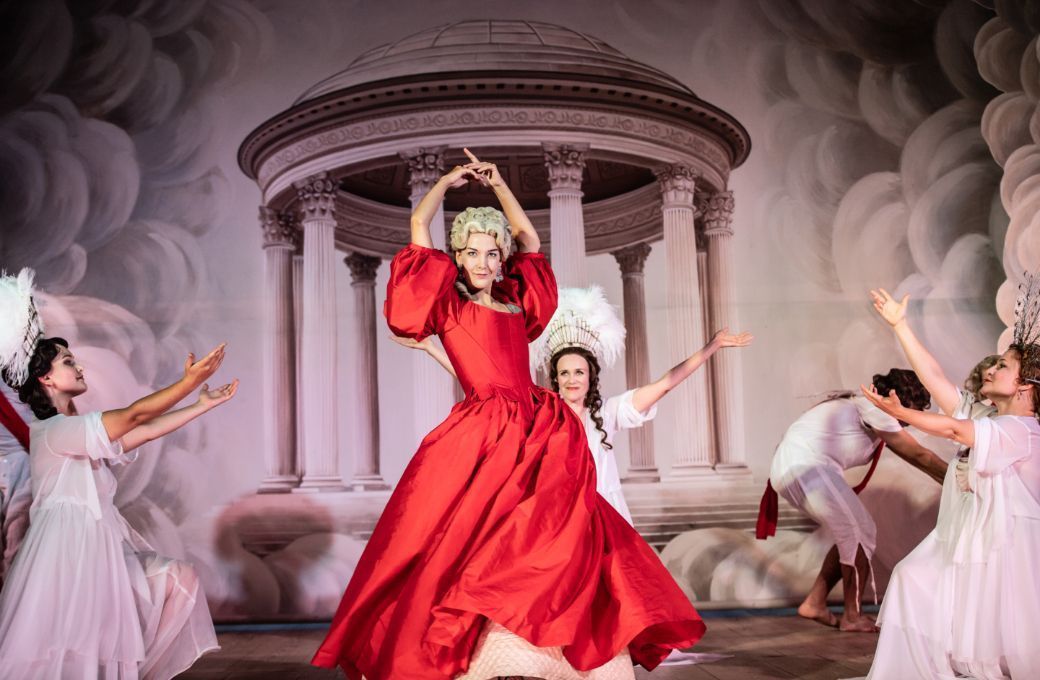Ida Ränzlöv was singing Cherubino in The Marriage of Figaro at Glyndebourne last summer when she missed a phone call. Ränzlöv didn’t recognize the number, but when she googled it, a familiar name came up: Bengt Hall, head of the Malmö Opera and, more significantly, chairman of the Birgit Nilsson Stipendium board.
“No, that can’t be it,” she thought.

But it was. When Hall called back, it was to tell Ränzlöv that she had won the 2023 Stipendium. The annual award to promising young singers confers a 200,000 SEK cash prize and no small amount of prestige, especially in Sweden, where Nilsson is a legendary figure.
“I told him I was in seventh heaven and incredibly honored to get the news,” Ränzlöv says. “I couldn’t believe it.”
First awarded in 1973, the Birgit Nilsson Stipendium has supported 46 young Swedish singers over the last 50 years. Past recipients include Hillevi Martinpelto, Nina Stemme, Anna Larsson and Malin Byström.
The astonishment still in Ränzlöv’s voice nine months later partly reflects the confidential nature of the award. There is no application process or competition. The four-member Stipendium board makes their choice for reasons that are not even shared with the singer until the award is formally presented (this year on 11th August). And coming as a complete surprise makes it seem like a dream.
“It’s fantastic when someone acknowledges your work without you even looking for it,” Ränzlöv says. “I’ve had pictures of Birgit Nilsson hanging on my walls since 2010. So getting this award is almost surreal.”
The award notwithstanding, it’s not quite accurate to describe Ränzlöv as “promising”. A better word would be “accomplished”. At 31, the Swedish mezzo is already in her fifth season as a member of the ensemble at Staatsoper Stuttgart and a regular guest at festivals like Glyndebourne and Confidencen in Stockholm, with a repertoire of nearly 30 roles ranging from Baroque to modern. This is a result of talent, hard work and a sink-or-swim attitude.
“I’m a firm believer in getting out of your comfort zone, that’s when you really learn,” she says. “When something new comes along, I close my eyes, take a deep breath and listen to my intuition – is it a yes or no? Very often it’s a yes. And the scarier the role, the louder the yes is.”
Ränzlöv did not come from a musical family. But she loved to sing at home as a child, prompting her parents to enroll her in a choir. When she was 17, her choir director told her that she had a voice worth developing. She started solo lessons without any clear idea of what she wanted to do until she saw a production of Carmen at one of the largest venues in Europe, Arena di Verona. Ränzlöv was with her father, and the experience changed her life.
“I had never heard that kind of volume coming out of someone without a microphone,” she recalls. “I turned to my father and said, ‘I need to learn how to do that.’ I was completely hooked.”
Ränzlöv started formal studies at the Malmö Academy of Music in southern Sweden in 2013, but after three years there the classroom walls felt confining. “I wanted to learn onstage, by actually doing the job,” she says. So she called a colleague, a British baritone whom she had met in a school production of La traviata. “You should get out of there and come to England,” he told her.
Which she did, enrolling in the Royal College of Music’s International Opera School in London, from which she graduated in 2018 with an Independent Opera Voice Award. By then Ränzlöv had a handful of roles to her credit, including Rosina in Il Barbiere di Siviglia and The Fox in The Cunning Little Vixen, and a voice good enough to win a slot in Glyndebourne’s Jerwood Young Artists program. That summer she also auditioned for the young artists program at Stuttgart, where matters moved quickly in the fall. She had been there all of two weeks when the singer cast as Rosina in an upcoming production of Il Barbiere di Siviglia got sick, and Ränzlöv was asked to step in.
“It happened really fast,” she says. “They called me in the morning, the conductor heard me sing the arias in the afternoon, and he said okay, rehearsals start tomorrow and we open in two weeks. I didn’t have any time to think about it, which I think was the best thing that could have happened.”
Ränzlöv has also followed an atypical career path in building a diverse repertoire rather than focusing on a particular area of expertise. “A lot of people say you shouldn’t sing different kinds of repertoire, you should find a niche,” she says. “But I enjoy it all too much to do that. Besides, I think that if you have a good and stable technique, you can navigate any repertoire.”
It also helps to have a spirit of adventure. Ränzlöv started as a soprano, settled into high mezzo roles, and as soon as she felt her voice getting a little bigger and heavier, approached Stuttgart directors about taking on Wagner. They liked the idea and cast her this season as a Norn in Götterdämmerung and one of the Rhinemaidens in Das Rheingold.
“I’m taking it slowly, in small steps – I won’t be singing Brünnhilde anytime soon,” she says. “For now I’m enjoying balancing light roles like Rosina with Wagner, which can be so difficult with the long phrasing and German language. Working on those two elements at the same time I find really rewarding.”
Other roles this season have given Ränzlöv an opportunity to broaden her acting skills. “Singing Hänsel in Hänsel und Gretel taught me a lot about stagecraft, I liked the freedom of playing a child onstage,” she says. The role of Meg Page in Verdi’s Falstaff proved to be more challenging. “It calls for an entirely different style of acting,” she says. “There’s a large cast and you have to be aware of what everyone else onstage is doing. But it’s a nice break, both vocally and doing comedy.”
The most significant role for Ränzlöv this season was Varvara in Káťa Kabanová. She became a Janáček fan after singing The Fox in London, but that was in English. This was her first opportunity to sing in Czech, and she was determined to get it right.
“I started working with a Czech coach early, around a year in advance,” she says. “The language was definitely a huge challenge, but that’s part of what drew me. And the music feels incredibly natural, his writing fits my voice perfectly. I found Czech a beautiful language to sing in and am looking forward to getting back to The Fox, which has become one of my dream roles.”
Also high on the list of dream roles is Octavian in Der Rosenkavalier. “I will be singing that in a European house in the spring of 2025,” Ränzlöv says. “I’m not allowed to say where yet, but it will definitely be a career milestone. I cannot wait.”
This August, Ränzlöv will take a break from singing Iphise in Rameau’s Dardanus in Stockholm to travel south to the village of Värsta Karup, where she will receive the Stipendium and give a recital in the church where Birgit Nilsson often sang. “It will be a program that mirrors my opera career so far, and some songs I like by Strauss and Dvořák, to get in some Czech, and obviously some Wagner, to celebrate Birgit,” she says.
There is a deep personal dimension to the award ceremony and performance, which in many ways will be like a homecoming for Ränzlöv.
“I grew up in the south, not far from where Birgit was born and lived,” she says. “I’ve been to her home, and I took master classes at the museum when I was student. She’s always been a huge inspiration and role model, not just musically, but in coming from a farmer’s daughter’s life and achieving what she did. I’ve always felt a close connection to that.”
Ränzlöv already knows what she will do with the prize money. “You can prepare some roles on your own, but if you want to see a Wagner specialist, or work with a Czech coach for a year, you need support,” she says. “And I travel to Switzerland and England every month for singing lessons. So in terms of furthering my career, this is a gift from above.”
And, she hopes, a stepping-stone back to her homeland.
“One of the reasons I was so surprised to get the award is that I haven’t worked much in Sweden,” she says. “I left there relatively early to go to London and then Germany. I would love to sing more in Stockholm and in Gothenburg. I think it’s the right time, and it’s always incredibly special to work in your home country. So I’m hoping this recital will open some eyes. And ears.”
First awarded in 1973, this year marks the 50th anniversary of the Birgit Nilsson Stipendium. Ida Ränslöv’s recital at the Birgit Nilsson Days is on Friday 11th August.
This interview was sponsored by the Birgit Nilsson Stipendium.


